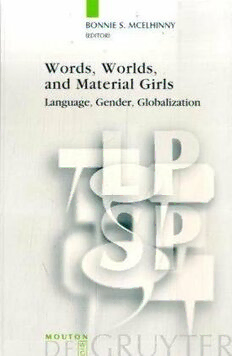
Words, Worlds, and Material Girls: Language, Gender, Globalization (Language, Power and Social Process) PDF
461 Pages·2008·1.595 MB·
Most books are stored in the elastic cloud where traffic is expensive. For this reason, we have a limit on daily download.
Preview Words, Worlds, and Material Girls: Language, Gender, Globalization (Language, Power and Social Process)
Description:
This wide-ranging volume explores how gender and language are used and transformed to discuss, enact, and project social differences in light of global economic and political changes in the late nineteenth, twentieth, and early twenty-first centuries. It presents analyses of language and gender from a broad spectrum of national contexts: Catalonia, Canada, China, India, Japan, Nigeria, Vietnam, Philippines, Tonga, and the United States. Cases studies consider language and gender in changing workplaces, schools and immigrant integration workshops, as well as in new and emerging sites for consumption and the production of identity. They also analyze the changing meanings of multilingualism, and the construction of ideologies about gender and language in colonial and postcolonial/national ideologies. The papers engage with and contribute to theoretical conceptualizations of globalization, cosmopolitanism, (post)colonialism, (trans)nationalism, and public spheres by drawing on a variety of sociolinguistic analytic strategies (variation analysis, media analysis, interactional sociolinguistics, ethnography of speaking, sociology of language, colonial discourse analysis).
See more
The list of books you might like
Most books are stored in the elastic cloud where traffic is expensive. For this reason, we have a limit on daily download.
